Your Guide to a Standout Artificial Intelligence Week
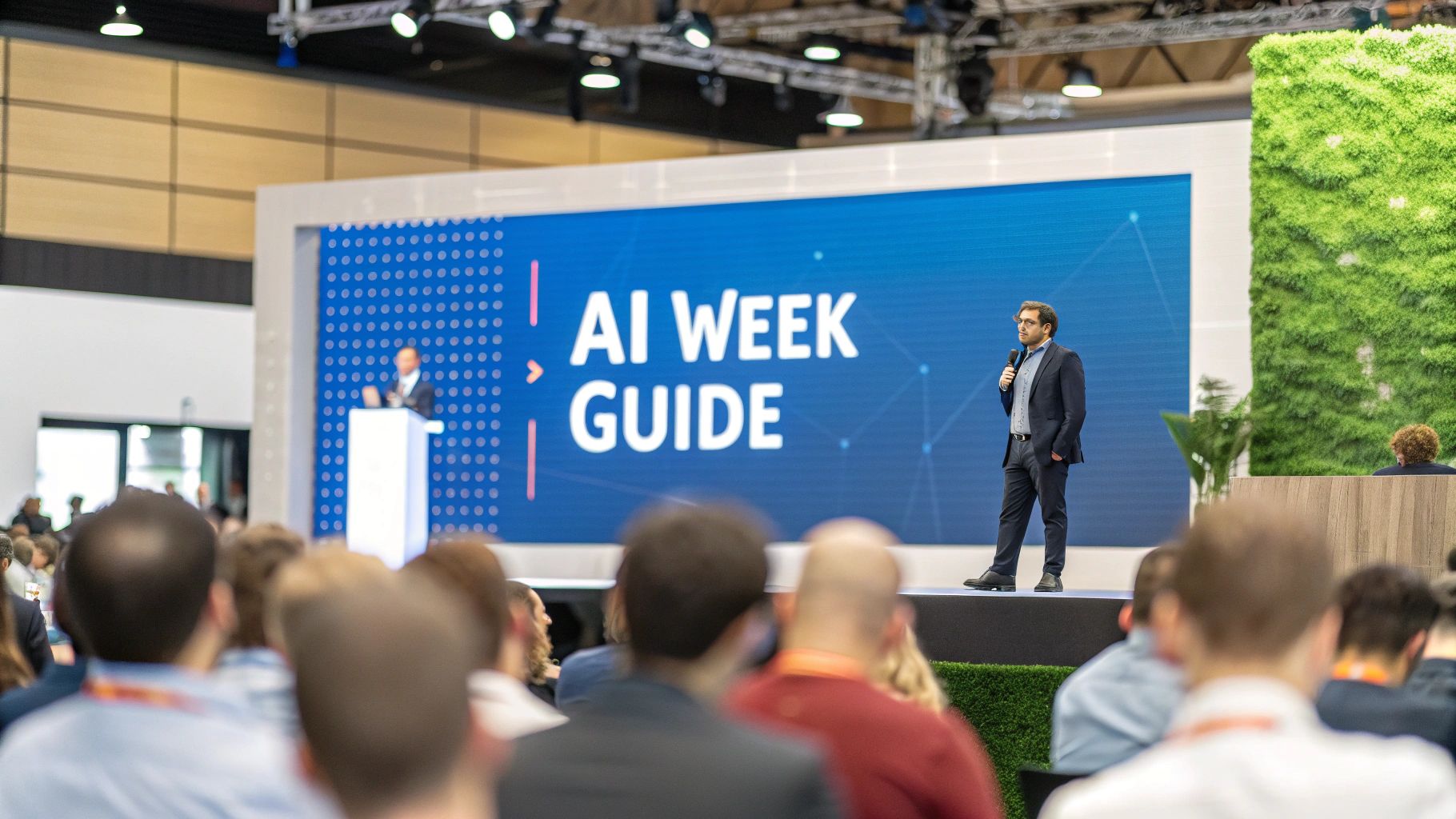
So, what exactly is an artificial intelligence week? Think of it as a focused, multi-day deep dive designed to get your entire organization or community fluent in the latest AI trends, tools, and strategies. It's a powerful way to upskill your teams, put innovation on full display, and get every stakeholder on the same page about the future of AI in your world.
Laying the Groundwork for Your AI Week
Planning a successful artificial intelligence week is about much more than just booking a venue and sending out some emails. It's an exercise in strategic design. Every single element—from your overarching theme down to the choice of keynote speakers—has to be deliberately aligned with a clear purpose.
Before you get to the exciting parts like brainstorming content and programming, the foundational work you do right now will make or break the event's ultimate impact. This is where you ask the big, tough questions. What are we really trying to achieve here? Who are we trying to reach? Nailing the answers to these will give you a roadmap for every decision that follows, making sure your event isn't just a meeting, but a genuine catalyst for change.
Defining Your Core Objectives
First things first: you have to define what success looks like for your organization. A fuzzy goal like "learning about AI" just won't cut it. Your objectives need to be tied to specific, measurable business outcomes. This clarity not only helps you build a laser-focused agenda but also makes it much easier to prove the event's value to leadership later on.
What’s the main driver behind this initiative?
- Upskilling and Education: Is the primary goal to boost the AI literacy of your internal teams? An objective here could be training 50 employees on specific generative AI tools or getting a whole department certified in a new AI-powered workflow.
- Talent Attraction and Recruitment: Maybe you want to position your company as the place to work for top AI talent. Success could be measured by the number of qualified applicants you get from the event or the new connections you forge with university AI programs.
- Brand Leadership and Innovation: Want to be seen as the thought leader in your space? Your KPIs might be media mentions, the number of C-suite execs who attend, or the successful launch of a new AI product during the week.
To make sure no detail gets missed, it’s always a good idea to start your AI Week prep by working through a comprehensive corporate event planning checklist. It covers everything from the initial concept all the way to post-event analysis.
Pinpointing Your Target Audience
Once your objectives are locked in, the next crucial step is defining who you’re talking to. The content, tone, and technical depth of your sessions will shift dramatically depending on who’s in the room. Are you catering to seasoned data scientists, or are you introducing basic AI concepts to your sales and marketing teams for the very first time?
Get specific and create detailed personas for your ideal attendees:
- C-Suite Executives: They're looking for the big picture. Give them high-level strategic insights focused on ROI, competitive advantage, and ethical governance.
- Technical Teams (Engineers, Data Scientists): This group wants to get their hands dirty. They'll be looking for technical deep dives, hands-on workshops, and detailed case studies.
- Business Leaders (Managers, Directors): They need to know how to apply it. Focus on practical applications, how to integrate AI into their teams, and where the productivity gains are.
Understanding these distinct needs helps you avoid the classic mistake of creating an event that's too generic to be truly useful to anyone. A targeted approach ensures every single person walks away with actionable knowledge they can apply to their role.
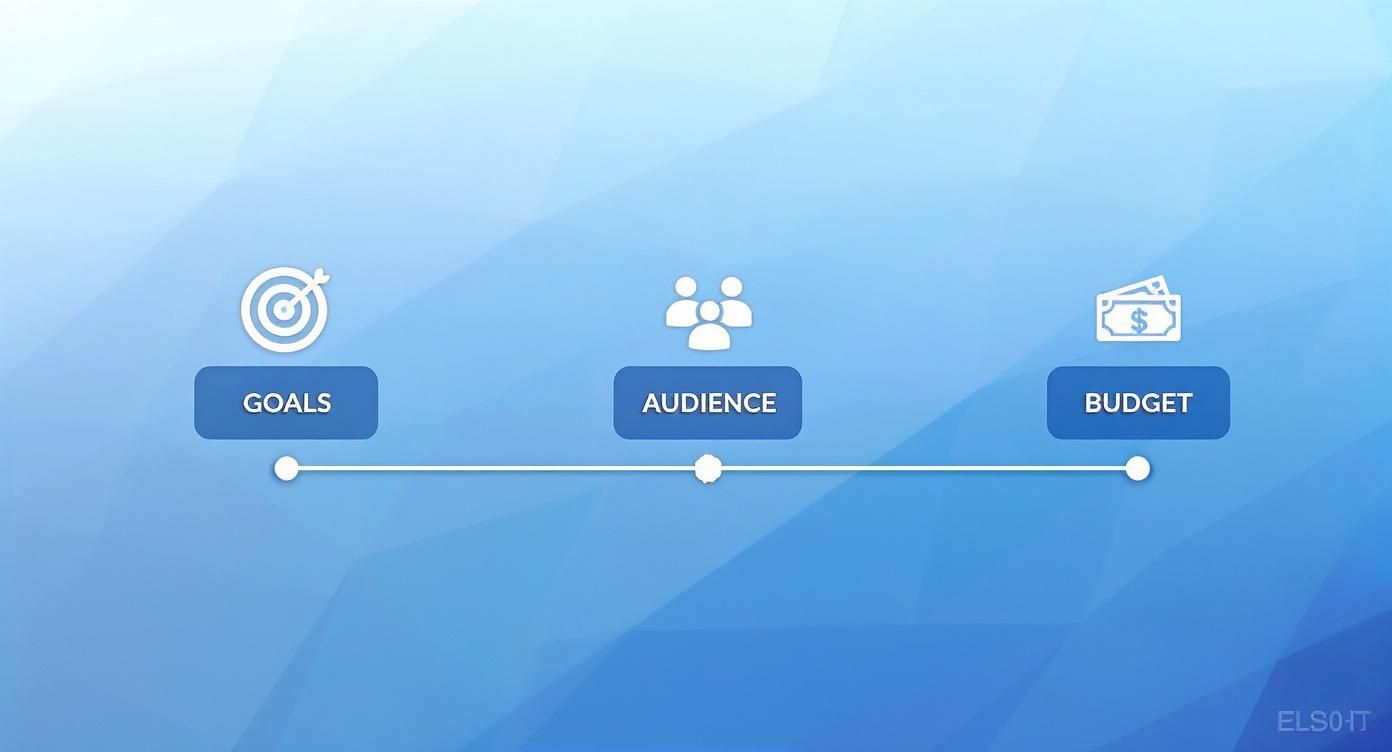
This visual really drives home how each foundational element directly informs the next, creating a planning sequence that just makes sense.
Building a Realistic Budget and Team
Finally, you need the resources—both money and people—to actually bring this vision to life. A solid budget needs to account for everything: venue rental, speaker fees, tech platforms, marketing, food, you name it. And please, don't forget to build in a contingency fund of 10-15%. Something always comes up.
Assembling the right team is just as important. You need a dedicated crew with clearly defined roles to keep things moving. A typical team structure might look like this:
An Event Lead: The project manager holding the vision and keeping everything on track.
A Content Coordinator: The mastermind behind the agenda, speakers, and session topics.
A Logistics Manager: The wizard who handles the venue, vendors, and all on-site operations.
A Marketing Specialist: The voice of the event, driving promotion, registration, and all communications.
With clear goals, a well-defined audience, and a solid plan for your resources, you’ve built the essential foundation for an AI week that will truly make an impact.
Curating Your Roster of AI Experts
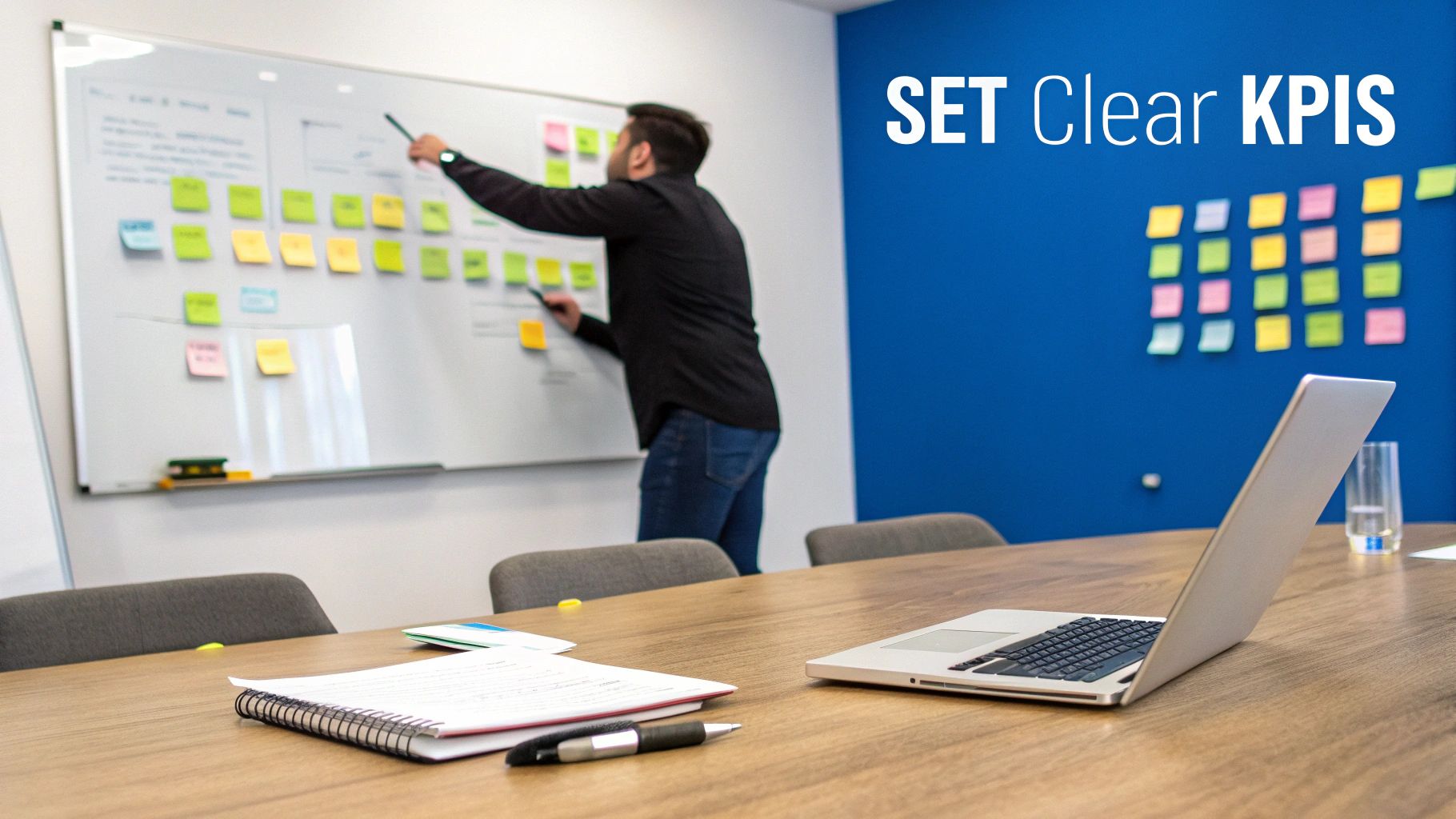
Let’s be honest: your speakers will make or break your entire artificial intelligence week. They are the main draw, the reason people hit "register," and the voices that will echo in your attendees' minds long after the event ends. You need a thoughtfully curated lineup that tells a cohesive story and delivers on your event's promise.
This isn't just about filling slots on an agenda. It's about creating a balanced program that speaks to everyone in the room. A well-chosen group of experts can turn a series of disconnected talks into a powerful, interconnected learning journey.
Assembling a Diverse Speaker Lineup
Your first move is to map out the different flavors of expertise your audience is craving. A truly great event serves up a mix of perspectives. Think about structuring your roster around a few key archetypes, ensuring every session delivers unique value.
- The Visionary Keynote: This is your headliner. Their job is to stretch minds and paint a vivid picture of what's next. Our roster includes pioneers like Adam Cheyer, the co-founder of Siri, whose talks on the future of intelligent assistants consistently inspire audiences.
- The Industry Practitioner: These are leaders who share real-world stories—the wins, failures, and actual ROI of AI implementation. Speakers like Cassie Kozyrkov, Google's first Chief Decision Scientist, offer pragmatic insights on applying AI in a corporate setting.
- The Technical Specialist: For a more advanced crowd, these experts can lead hands-on workshops on specific tools or platforms. Think of deep-dive sessions that provide the "how-to" knowledge your technical teams need.
- The Ethicist or Governance Expert: As AI adoption grows, conversations around ethics and regulation are non-negotiable. Including an expert on these topics, such as a specialist from a leading university or research institute, adds critical depth and shows a commitment to responsible innovation.
This balanced approach guarantees that every attendee, from the CEO to the data scientist, walks away with something valuable.
Vetting Expertise and Aligning Topics
Once you've got a wish list of speakers, the real work begins. The best speakers aren't just smart; they're fantastic communicators who can command a room and make complex ideas feel simple.
Start by watching videos of their past talks. Do they have energy? Do they present with clarity? How do they handle tough questions? This simple quality check can save you from a painfully flat session.
Next, you need to align their specific expertise with your event's narrative. Don't let them just show up and give their canned stump speech. Give them a detailed speaker brief that spells out:
- Your event's core theme and what you want the audience to feel or do afterward.
- The specific persona they’ll be talking to (e.g., C-suite leaders, marketing VPs, junior engineers).
- How their session fits into the bigger picture of the day's or week's agenda.
Pro Tip: Always schedule a quick "chemistry call" with your top candidates. A 15-minute chat can tell you more about their passion, personality, and willingness to customize their content than a dozen emails ever could.
A speaker who is genuinely fired up about your event's mission will always deliver a more memorable and impactful talk. If you need a solid starting point for your research, check out a curated list of the top AI speakers for 2025.
Managing Speaker Logistics and Fees
Getting a "yes" from a great speaker is just the beginning. You need a slick, professional process for handling contracts, travel, and their on-site experience. It shows you respect their time and sets the tone for a great partnership.
Talking money is a big part of this. Speaker fees can swing wildly, from a few thousand dollars for an up-and-comer to well into the six figures for a world-renowned thought leader. Be upfront about your budget from the very first conversation. If it’s tight, get creative. You can offer value in other ways, like covering travel for a partner, providing a professionally produced video of their talk, or promising exclusive networking opportunities.
Finally, give every speaker a single, dedicated point of contact for all their logistics. This person is their go-to for everything—flight bookings, hotel rooms, A/V checks, and pre-event briefing calls. Providing this white-glove support frees up your speakers to focus on what they do best: delivering a knockout presentation.
Designing an Agenda That Sparks Innovation
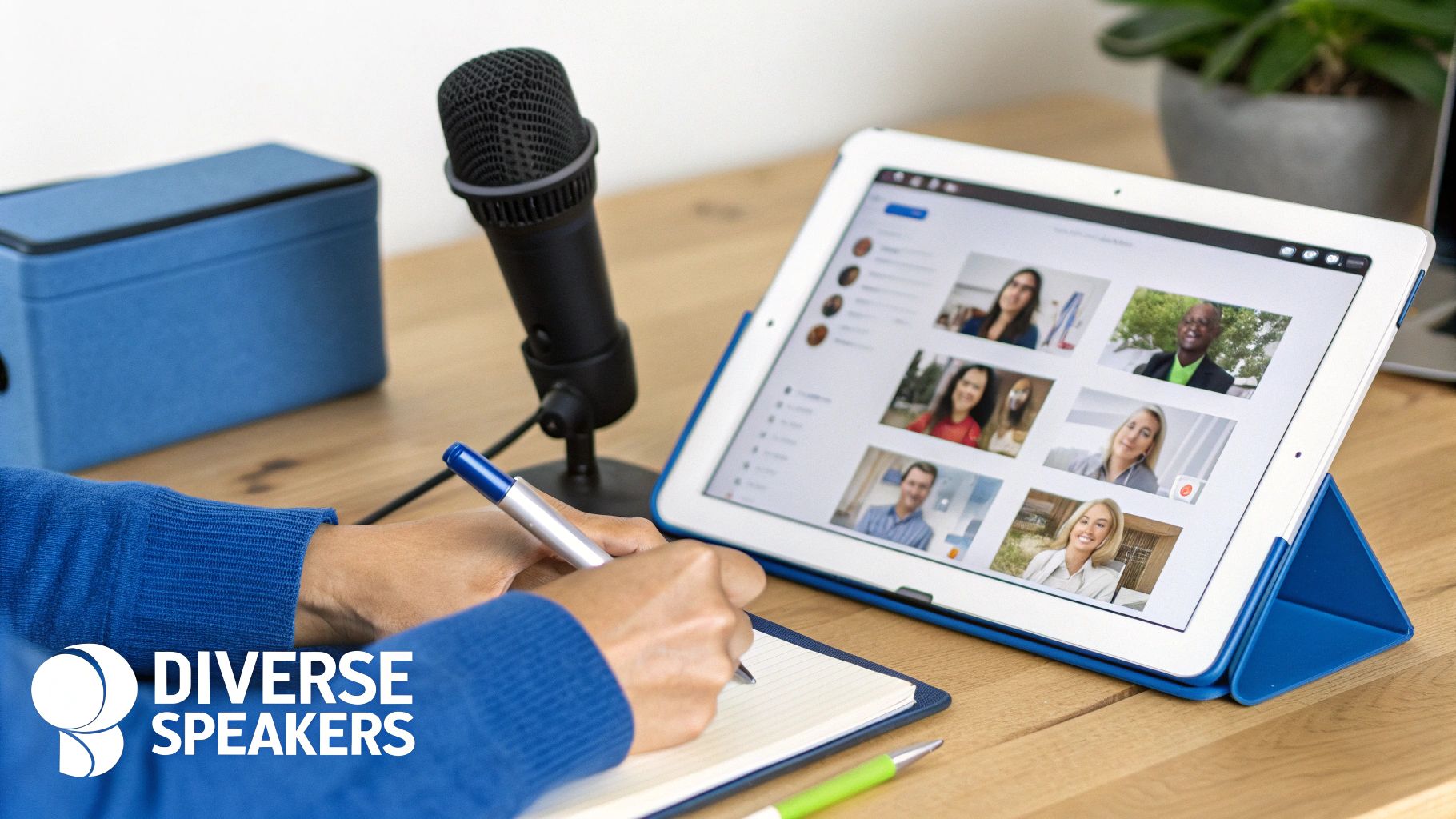
A powerful agenda is the narrative spine of your artificial intelligence week. Think of it less like a schedule and more like a carefully crafted journey designed to guide your attendees from initial curiosity to deep, actionable insight. The goal is to create a program that feels cohesive, builds knowledge logically, and keeps energy levels high from the opening keynote to the final handshake.
Moving beyond a series of disconnected talks is essential. A truly innovative agenda weaves together different formats, creating a rich tapestry of learning experiences. Some people absorb best by listening to a visionary, while others need to get their hands dirty in a workshop. Your program has to serve them all.
Balancing Inspiration with Practical Application
The magic of a great agenda lies in its balance. You need sessions that zoom out to the 30,000-foot view alongside sessions that dive deep into the technical weeds. Kicking off each day with a high-energy, visionary keynote can set an inspiring tone and frame the big ideas your attendees will explore.
From there, you can transition into more focused content. Think about structuring your days for a natural flow:
- Morning Keynotes: Start with big-picture inspiration from a thought leader who can speak to the future of AI and its broad industry impact.
- Mid-Day Panels: Bring together diverse experts for interactive panels on complex topics like AI ethics, data privacy, or the future of work.
- Afternoon Workshops: Dedicate the afternoons to hands-on workshops where attendees can learn a new skill or work through a real-world problem with a practitioner.
This variety prevents session fatigue and ensures there’s a valuable track for everyone, from the C-suite executive to the machine learning engineer.
Creating a Narrative Flow
Your agenda should tell a story. Instead of presenting random topics, structure the week to build on itself. Maybe Day 1 focuses on foundational concepts and the current state of AI. Day 2 could explore specific industry applications, and Day 3 could look ahead to future trends and ethical considerations.
This thematic approach helps attendees connect the dots between sessions. It turns passive listening into active learning as they see how different pieces of the AI puzzle fit together.
A well-structured narrative transforms your event from a collection of presentations into a coherent educational experience. It ensures that by the end of the week, attendees don't just leave with notes; they leave with a new framework for thinking about AI.
The global AI user base is expanding at a breakneck pace, predicted to grow by 20% in 2025 to reach 378 million users. This rapid adoption is driven by the fact that approximately 66% of the world's population already engages with AI intentionally every single day. Your agenda must speak to this growing, diverse audience by showing them not just what AI is, but how it directly applies to their world. You can find more details in this report on AI statistics for 2025.
Integrating Interactive and Networking Elements
Learning doesn’t just happen in lecture halls. Some of the most valuable moments at an artificial intelligence week occur during informal conversations and hands-on experiences. Your agenda must intentionally create space for these interactions to flourish.
Incorporate dynamic elements that break up the traditional speaker-on-a-stage format:
- Live Tech Demos: Partner with innovative startups or your own R&D teams to showcase cutting-edge AI tools in action. Seeing is believing.
- Startup Showcases: Dedicate a session where emerging AI companies can pitch their ideas. This injects fresh energy and exposes attendees to the next wave of innovation.
- Structured Networking: Go beyond coffee breaks. Organize "topic tables" at lunch focused on specific industries or challenges to facilitate more meaningful connections.
To help you visualize this mix, here's a breakdown of different session types you could incorporate into your agenda.
Sample Artificial Intelligence Week Session Formats
| Session Format | Target Audience | Primary Goal | Example Topic |
|---|---|---|---|
| Visionary Keynote | All Attendees | Inspire & Set the Tone | "The Next Decade of AI: From Automation to Augmentation" |
| Panel Discussion | Executives, Managers | Explore Nuance | "Navigating AI Ethics and Data Privacy in the Enterprise" |
| Hands-On Workshop | Technical Staff, Developers | Skill Building | "Building Your First Generative AI Application with Python" |
| Case Study Session | Department Leaders | Practical Application | "How We Cut Operational Costs by 30% with Predictive AI" |
| Tech Demo | All Attendees | Showcase Innovation | "Live Demonstration: AI-Powered Customer Service Bots in Action" |
| Roundtable | VPs, Directors | Peer-to-Peer Learning | "Solving Supply Chain Challenges with AI" |
A well-rounded agenda will pull from several of these formats, ensuring there's something for everyone. For a deeper dive into how AI is being used across different sectors, explore our guide on AI use cases by industry.
By thoughtfully designing an agenda that blends inspiration, practical education, and genuine connection, you create an environment ripe for innovation. Your attendees will leave not only smarter but also more connected and motivated to drive change within their own organizations.
Managing Event Logistics and Promotion

This is where the magic really happens. A groundbreaking agenda and A-list speakers are fantastic, but seamless execution is what separates a good event from a truly unforgettable one. Now that you've locked in the "what," it's time to shift focus to the "how"—the intricate dance of logistics and the strategic art of promotion.
These two pieces are the engine that powers your artificial intelligence week. They ensure a smooth, frictionless experience for every attendee and make sure people actually show up in the first place. This phase demands a dual focus: flawless operational planning on one side and a magnetic marketing strategy on the other. Every detail, from securing a tech-ready venue to creating buzz online, is about building anticipation and guaranteeing the event itself runs like clockwork.
Selecting the Right Venue and Tech Platform
Your venue isn't just a room; it’s the physical stage for your entire event. When you're scouting locations, look beyond simple capacity. For an AI-themed week, the technical infrastructure is non-negotiable.
Can the Wi-Fi handle hundreds (or thousands) of devices hammering it at once without crumbling? Are the breakout rooms kitted out with modern AV gear that will make presentations and live demos look crisp and professional? These aren't luxuries; they're essentials.
Don't forget about accessibility, either. The location should be easy to get to, and it must accommodate attendees with disabilities. A great environment removes friction so your guests can focus on what matters: the content.
Just as critical is your choice of an event tech platform. This is the digital command center for your attendees. A solid platform handles everything from registration and payment to agenda updates and push notifications. If you're running a hybrid event, the platform's virtual capabilities are make-or-break for delivering a quality experience to your remote audience.
Building an Unforgettable Promotional Campaign
With your logistical foundation in place, it’s time to shout about your AI week from the rooftops. A multi-channel promotional strategy is the only way to build momentum and drive registrations in today's noisy world. Your campaign needs to be a cohesive effort that meets your target audience where they live online.
Kick things off with a targeted email marketing campaign. Don't just blast your whole list. Segment it. Send personalized messages to executives, developers, and marketers, highlighting the speakers and sessions that will specifically appeal to them.
An effective promotional strategy doesn't just inform; it creates a sense of urgency and community. By showcasing the unique value and transformative potential of your event, you turn potential attendees into enthusiastic advocates before they even walk through the door.
Next, get creative on social media. A steady stream of engaging content is key. Speaker spotlights with sharp headshots and punchy quotes work wonders. Short video interviews with your keynotes can generate massive buzz. And please, create a unique event hashtag from day one to centralize the conversation and encourage people to share their own excitement.
Staying organized through all this is vital. Using a structured timeline can be a total lifesaver. For a detailed guide, you can find a helpful event planning timeline template that breaks down every step.
Amplifying Your Reach with Partnerships and Swag
To break out of your own echo chamber, you need to forge strategic partnerships. Reach out to industry media, professional associations, and relevant tech blogs. Offering media passes in exchange for pre-event coverage can dramatically boost your visibility. Working with sponsors who already have the ear of your target audience is another great way to tap into new pools of potential attendees.
Finally, never underestimate the power of good swag. Thoughtful, useful promotional items can seriously enhance the attendee experience and keep your brand on their desk long after the event wraps. When planning your AI Week, choosing the right giveaways can boost engagement and leave a lasting impression. Check out these 15 tips to choose the best promotional products for ideas that go way beyond a cheap pen.
By weaving these logistical and promotional threads together, you’re not just planning an event—you're crafting an experience that will run smoothly and achieve the impact it deserves.
Bringing the AI Week to Life (And Beyond)
After months of planning, it's finally here. The moment your AI week kicks off, the focus shifts entirely from spreadsheets and strategy calls to the real-world, real-time experience you're creating for everyone in the room. This is where a flawless execution makes all the difference, turning a good event into an unforgettable one.
The invisible work—a smooth speaker check-in, flawless AV, and a team that anticipates needs before they arise—is what allows your content to truly take center stage. When logistics are seamless, attendees stay locked in on the insights, not the distractions.
Nailing the On-Site Experience
A world-class on-site experience doesn't happen by accident. It’s built on the back of a hyper-detailed run-of-show document that your entire team treats as their bible. This schedule should be granular, mapping out everything from the moment a speaker arrives to the transition music between sessions.
But a smoothly run event is just the baseline. The real magic happens when you pull the audience into the action. Passive listening is the enemy of engagement; you need to make them participants, not just spectators.
Here are a few ways to get people actively involved:
- Live Q&A and Polling: Use tools like Slido or Mentimeter to let the audience guide the conversation. It instantly transforms a one-way lecture into a dynamic dialogue.
- Themed Networking Spaces: Don't just offer a generic "lounge." Create dedicated areas like an "AI in Healthcare Hub" or a "Machine Learning Startup Corner" to help people with shared interests find each other organically.
- Gamify the Experience: A little friendly competition goes a long way. Use your event app to award points for checking into sessions, connecting with sponsors, or networking with peers. Offer a cool prize for the top scorer to get things buzzing.
Keeping the Momentum Going Post-Event
The curtain call on the final day isn't the end—it's the beginning of your long-term engagement strategy. The ideas and connections sparked during your AI week need a place to live on and grow. If you don't follow up, you're leaving a massive amount of value on the table.
Your first move? Send a "thank you" email and a feedback survey within 48 hours. This timing is crucial. The experience is still fresh, so you’ll get honest, specific feedback you can actually use for next year.
Your post-event follow-up is a critical part of the attendee journey. It demonstrates a commitment to continued learning and community building, ensuring your event's influence endures far beyond the week itself and maximizing its overall ROI.
Once the dust settles, it's time to map out how you'll keep the conversation alive. This isn’t just about being helpful; it's about creating powerful marketing assets that prove the value of your event to future attendees and sponsors.
Building a Lasting Content Legacy
Your event just produced a treasure trove of expert knowledge. Now, it's time to slice it, dice it, and share it with the world. A smart content repurposing plan ensures the insights from your stages reach a much wider audience and deliver value for months to come.
Here’s a simple, effective content plan:
- Release the Session Recordings: Edit your keynotes and panels, then host them in a video library. Give your attendees exclusive access first as a "thank you" perk before releasing them publicly to build hype for your next event.
- Write "Key Takeaway" Blog Posts: Not everyone has time to watch a 45-minute video. Synthesize the best sessions into scannable articles that are perfect for sharing on your blog and in newsletters.
- Create Visual Soundbites: Pull the most powerful quotes from your speakers and design them into sharp, shareable graphics for LinkedIn and X (formerly Twitter). It’s a fantastic way to amplify your speakers' reach while cementing your event's authority.
This strategy does more than just fill a content calendar. It nurtures the community you’ve built and reinforces the urgency of the AI conversation. And that conversation is only getting bigger. By 2030, AI is projected to create a net 170 million new jobs globally, and in 2025, 92% of companies plan to boost their AI investments.
To dig deeper into how AI is reshaping the modern workplace, you can read the full research about AI's workplace potential from McKinsey.
Common Questions About Planning an AI Week
Organizing a multi-day event around a topic as fast-moving as artificial intelligence can feel like a massive undertaking. Even with a great plan, questions always pop up. Here are some of the most common ones we hear from event planners, along with some practical answers to help you sidestep hurdles and make your AI Week a huge success.
How Far in Advance Should I Plan an Artificial Intelligence Week?
For an event of this scale, give yourself a 9-12 month planning window. I know it sounds like a lot, but it's absolutely essential.
The best speakers—think Stanford professors, AI executives, or sought-after researchers—are often booked a year or more in advance. Our roster, for instance, is packed with specialists who are in high demand globally. Locking them in early is non-negotiable.
This longer lead time also gives you way more leverage with venues and vendors, helping you avoid those last-minute budget blowouts. Plus, it gives your marketing team the runway they need to build real momentum, hitting registration targets without that stressful final push. Think of it as a built-in buffer for any curveballs that come your way.
What Are the Most Common Pitfalls to Avoid?
One of the biggest mistakes we see is creating an agenda that misses the mark on technical depth. It's either way too technical for a business-focused audience or far too basic for the actual experts in the room. You have to find that sweet spot. For example, a deep dive into machine learning theory might cause your marketing VPs to tune out, while a generic "Intro to AI" talk will have your data science team scrolling through their phones.
Another classic pitfall is underestimating the tech requirements. This isn't the place to skimp. You need rock-solid Wi-Fi that can handle hundreds of people running demos and streaming at once. Flawless AV support for live demonstrations isn't a "nice to have"—it's foundational.
Finally, don't let the conversation die when the event ends. So many organizers neglect post-event engagement. To get the most long-term value, you need a solid plan for distributing content and keeping the community connected long after the lights go down.
A successful artificial intelligence week is defined by its ability to cater to diverse knowledge levels. The key is curating a speaker roster with a mix of visionaries for inspiration, practitioners for real-world case studies, and specialists for deep-dive workshops, ensuring every attendee finds immense value.
How Can I Measure the ROI of My AI Week?
Measuring ROI circles right back to the clear objectives you set at the very beginning. Your key performance indicators (KPIs) should be directly tied to those initial goals. It’s the only way to prove value.
- For Lead Generation: Track the number of qualified leads you capture. This can come from registration forms, interactions within your networking app, or sponsor booth visits.
- For Brand Awareness: Keep an eye on media mentions, social media engagement (like hashtag usage and reach), and any spikes in website traffic during and after the event.
- For Internal Education: Use post-event surveys and maybe even short assessments to see how much your employees' knowledge and skills have grown.
When you connect these tangible outcomes to your event budget, you can paint a very clear and compelling picture of its return on investment for your stakeholders.
What Is the Best Way to Facilitate Networking?
You have to move beyond the standard coffee break. The goal is to create structured opportunities for people to have meaningful conversations. A great speaker can get a conversation started, but it's the environment you build that lets it truly flourish.
Try setting up "topic tables" during lunch that are focused on specific AI domains like healthcare, finance, or ethics. These curated spaces help attendees with shared interests find each other without any awkward intros.
Your event app is another powerful tool here. Enable attendees to schedule one-on-one meetings with each other and with speakers directly through the app. Themed receptions or interactive "problem-solving" workshops are also fantastic for fostering deeper connections than a simple business card swap ever could.
Finding the right voices to anchor these conversations is the most critical step. At Speak About AI, we connect you with leading AI experts—from the co-founders of Siri to top minds at Google—who deliver actionable insights that make your event unforgettable.
Discover the perfect speaker for your artificial intelligence week at https://speakabout.ai.
